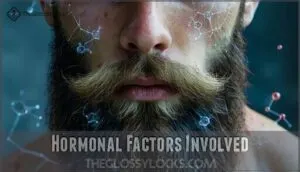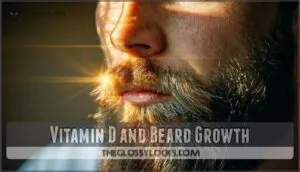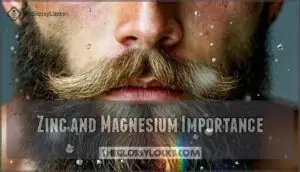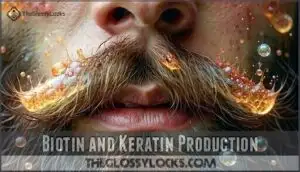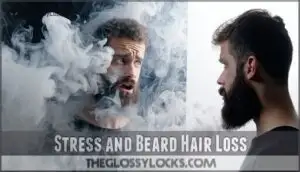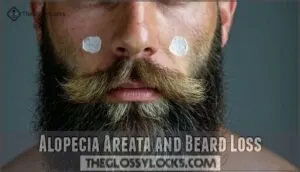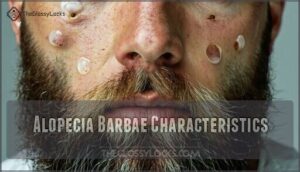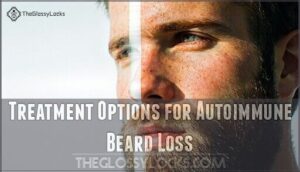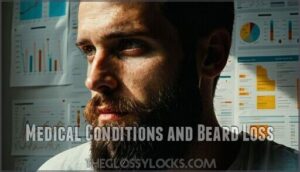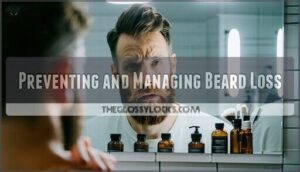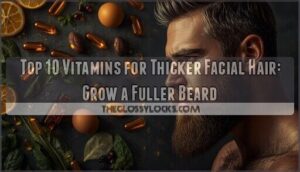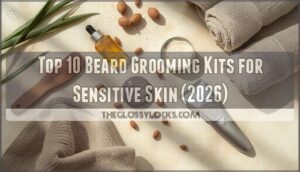This site is supported by our readers. We may earn a commission, at no cost to you, if you purchase through links.

Hormonal imbalances, particularly low testosterone and DHT levels, often play the leading role in thinning beards.
Nutritional deficiencies—especially zinc, biotin, and vitamin D—can leave your follicles struggling to produce healthy hair.
Chronic stress triggers cortisol spikes that push hair into the shedding phase, while autoimmune conditions like alopecia areata create patchy bald spots.
Medical issues including thyroid disorders and diabetes also disrupt normal growth cycles.
The silver lining? Each cause has specific solutions that can help restore your beard’s former glory.
Table Of Contents
Key Takeaways
- Your hormones control your beard’s destiny – Low testosterone and DHT levels are the primary culprits behind thinning facial hair, while thyroid disorders and hormonal imbalances can disrupt your natural growth cycles and leave you with patchy, weak beard growth.
- You’re starving your follicles without proper nutrition – Deficiencies in zinc, biotin, vitamin D, and protein directly weaken your hair structure and slow growth rates, while aggressive dieting crashes your testosterone production and compounds the problem.
- Stress is literally making your beard fall out – Chronic stress elevates cortisol levels that push more beard hairs into the shedding phase, suppress testosterone production, and prevent your follicles from functioning properly.
- Your immune system might be attacking your beard – Autoimmune conditions like alopecia areata and alopecia barbae cause sudden, circular bald patches in your beard area, while medical conditions like diabetes and psoriasis create inflammation that damages follicle health.
Beard Hair Loss Causes
You’ll find that several key factors contribute to beard hair loss, ranging from natural growth cycles to hormonal imbalances and nutritional deficiencies.
Understanding these underlying causes helps you identify which factors might be affecting your beard’s thickness and develop targeted solutions for healthier facial hair growth, using your knowledge of these factors to improve your beard’s health.
Natural Facial Hair Growth Cycle
Your beard naturally sheds 50-150 hairs daily through the hair growth cycle.
During the anagen phase, follicles actively produce new hair growth for 2-6 years.
The telogen phase follows, where approximately 10% of your beard enters follicle dormancy, representing normal beard hair shedding, not permanent facial hair loss requiring concern.
Low Testosterone and DHT
Your body’s testosterone and DHT levels directly control beard growth through androgen receptors in hair follicles.
When testosterone converts to DHT, it activates these receptors, but DHT sensitivity varies genetically.
High levels create three distinct patterns:
- Patchy growth with uneven density
- Slow-growing, thin facial hair
- Premature follicle miniaturization
Testosterone therapy and hormone replacement can help, though finasteride risks include potential hormonal anomalies and androgen receptor downregulation.
High levels of DHT can lead to androgenic alopecia symptoms.
Aggressive Dieting and Micronutrient Deficiencies
When you slash calories too aggressively, your body’s endocrine system takes a hit, reducing testosterone production essential for beard growth.
When you crash diet, your hormones crash too—taking your beard down with them.
Micronutrient deficiencies from poor nutrition create a perfect storm – your follicles can’t access zinc, biotin, and B-vitamins needed for healthy hair.
Protein deficiency compounds the problem since beard hair is primarily keratin, leaving you with patchy, thinning facial hair.
What Causes Beard Loss
You’re experiencing beard hair loss due to multiple interconnected factors that affect your hair follicles, including hormonal imbalances, autoimmune conditions, nutritional deficiencies, and chronic stress.
Understanding these underlying causes helps you identify which specific factors contribute to your beard thinning, enabling you to pursue targeted treatments and lifestyle modifications that address the root problems rather than just the symptoms.
This approach allows for a more effective solution by tackling the root problems, leading to better outcomes in addressing beard hair loss.
Impact On Daily Life
Experiencing beard hair loss affects more than just your appearance—it touches every corner of your daily interactions.
Beard loss isn’t just about looks—it reshapes how you connect with the world around you.
You might notice changes in how you engage with others and view yourself.
The psychological impact of facial hair loss manifests in several key areas:
- Social Interactions become strained as you feel self-conscious about patchy growth
- Self-Esteem Impact develops when your confidence wavers during conversations
- Relationship Effects emerge as stress affects intimate connections
- Career Implications surface when professional image concerns arise
Future Technological Advances
Looking ahead, breakthrough technologies promise revolutionary beard restoration solutions.
AI diagnosis systems will pinpoint exact causes of your hair loss, while gene editing could correct genetic deficiencies.
Stem cell therapy and nanotech growth factors may regenerate dormant follicles.
Advanced hair transplantation techniques, combined with robotic grooming systems and enhanced LLLT devices, will offer precise, personalized treatments for ideal results.
Additionally, AI-driven skin analyzers may soon be adapted for precise follicle analysis.
Ethical Considerations And Challenges
Beard hair loss treatments raise important ethical questions you should consider.
Informed consent becomes complex when genetic testing reveals predisposition to hair loss causes, potentially leading to genetic discrimination by insurers.
Treatment access varies widely based on income, creating disparities in hair loss prevention options.
Body image pressures from social media can negatively impact mental health, making men feel inadequate about natural beard loss patterns.
Hormonal Factors Involved
Your beard’s growth depends heavily on hormones, particularly testosterone and dihydrotestosterone (DHT), which regulate follicle activity and hair density.
When these hormone levels fluctuate or decline due to age, medical conditions, or thyroid dysfunction, you’ll notice thinning patches or reduced beard growth that affects overall facial hair quality, influenced by testosterone.
Testosterone Role in Beard Growth
Hormones act as your beard’s main conductor, with testosterone taking center stage.
Your body converts testosterone into DHT through enzymatic conversions, directly stimulating follicle growth.
When testosterone levels drop or hormonal imbalances occur, you’ll notice patchy beards and slower growth.
These androgenic hormones determine follicle sensitivity, making some men naturally blessed with fuller facial hair than others.
DHT Impact on Beard Hair
Dihydrotestosterone, or DHT, acts like testosterone’s stronger cousin in your beard follicles.
While testosterone kickstarts facial hair growth, DHT binds to androgen receptors and determines your beard density.
However, excessive DHT sensitivity can trigger follicle miniaturization, causing androgenic alopecia.
This hormonal imbalance creates a catch-22: you need DHT for growth, but too much shrinks follicles, leading to patchy beards.
Thyroid Hormones and Beard Growth
Beyond DHT’s influence, your thyroid glands produce T3 and T4 hormones that directly regulate beard follicle cycles.
Hypothyroidism effects include shortened growth phases and increased shedding, while hyperthyroidism link causes premature hair loss through accelerated cycles.
These thyroid disorders disrupt your endocrine system’s delicate balance.
Deficiencies in key nutrients can also play a role, so addressing nutritional deficiencies is essential.
Fortunately, proper thyroid medication can restore normal beard growth patterns.
Micronutrient Deficiencies Effects
Your body requires specific vitamins and minerals to produce healthy beard hair, and deficiencies in these essential nutrients can substantially impact your facial hair growth and density.
When you lack adequate levels of vitamin D, zinc, magnesium, or biotin, your hair follicles can’t function at their best, leading to weakened hair structure, slower growth rates, and increased hair loss in your beard area.
Vitamin D and Beard Growth
Your beard follicles depend on adequate vitamin D for healthy growth cycles.
Vitamin D synthesis supports follicle vitamin D receptors that regulate hair development.
When you’re deficient, deficiency symptoms include weakened hair shafts and increased beard hair loss.
Supplementation effects show promise for improving beard growth, as vitamins address underlying nutritional deficiencies affecting your facial hair density.
Zinc and Magnesium Importance
Zinc deficiency statistically correlates with various forms of alopecia, including beard hair loss. Your hair follicles require adequate zinc levels to maintain healthy beard density.
Magnesium benefits include supporting testosterone production and reducing inflammation around follicles. However, supplementation risks exist with over-supplementation potentially causing adverse effects.
Both minerals work together, supporting the vitamins your body needs for ideal beard growth and preventing further hair loss. Deficiencies in key nutrients can also impact hair health, so consider supplements if needed.
Biotin and Keratin Production
Your body relies on biotin to fuel keratin synthesis, the protein that forms your beard’s hair structure.
Without adequate biotin from protein intake or supplements, your follicles can’t produce strong, healthy strands.
Biotin deficiency directly contributes to beard hair loss by weakening the fundamental building blocks of facial hair.
Quality vitamins and minerals support supplement efficacy for maximum beard growth.
Stress and Beard Hair Loss
When you’re constantly stressed, your body produces elevated levels of cortisol, which disrupts the natural hair growth cycle and pushes more beard hairs into the telogen phase where they fall out.
This stress-induced hair loss, known as telogen effluvium, can cause noticeable thinning in your beard as cortisol suppresses testosterone and DHT production while interfering with androgen receptors in hair follicles.
Chronic Stress Effects on Hair
When life’s pressures mount, your beard pays the price.
Chronic stress triggers elevated cortisol levels, disrupting your hair’s natural growth cycle and pushing follicles into premature resting phases.
This stress-induced telogen effluvium causes noticeable beard hair loss over time.
Additionally, sustained stress leads to androgen receptor downregulation, preventing testosterone from effectively supporting healthy beard growth and density.
Cortisol and Telogen Effluvium
When stress hits hard, your body ramps up cortisol production, creating a domino effect that disrupts hair follicles.
This stress hormone triggers telogen effluvium by forcing more beard hairs into their resting phase prematurely.
Cortisol also causes androgen suppression and receptor downregulation, meaning your testosterone can’t effectively bind to follicles, leading to noticeable beard hair loss over time.
Antioxidants and Stress Mitigation
Antioxidant mechanisms work like your body’s cleanup crew, neutralizing free radicals that damage hair follicles during stressful periods.
Vitamin C and vitamin E provide oxidative stress relief by protecting cellular structures from cortisol’s harmful effects.
Diet supplementation with these antioxidants supports stress hormone reduction, helping prevent stress-induced beard hair loss causes while promoting healthier follicle function and growth.
Autoimmune Disorders Impact
Your immune system can mistakenly attack your beard hair follicles, causing patchy hair loss through conditions like alopecia areata and alopecia barbae.
These autoimmune disorders create circular bald spots in your beard area, often appearing suddenly and requiring specialized medical treatment to manage effectively.
Alopecia Areata and Beard Loss
Autoimmune mechanisms trigger alopecia areata, causing patchy beard hair loss when your immune system mistakenly attacks healthy hair follicles.
This autoimmune condition affects facial hair through genetic predisposition and environmental factors.
Treatment efficacy varies, but early intervention improves outcomes and reduces psychological impact from sudden beard changes.
- Circular bald patches: You’ll notice smooth, round areas where beard hair suddenly disappears overnight
- Unpredictable progression: Hair loss can spread to other facial areas or remain isolated to specific beard sections
- Immune system confusion: Your body’s defense mechanism incorrectly identifies hair follicles as foreign invaders requiring elimination
Alopecia Barbae Characteristics
Alopecia barbae manifests as distinct circular bald spots throughout your beard area, creating patchy beard loss that can appear overnight or develop gradually over weeks.
This autoimmune condition targets hair follicles specifically in facial regions, with stress triggers often preceding onset.
Alopecia barbae symptoms include smooth, coin-sized patches where beard hair loss occurs completely, distinguishing it from typical thinning patterns, and can be characterized by autoimmune condition and circular bald spots.
Treatment Options for Autoimmune Beard Loss
Several effective treatments can restore your beard when you’re dealing with this autoimmune disorder.
Corticosteroid treatments and corticosteroid injections show remarkable success, with topical applications achieving complete regrowth within six months.
JAK inhibitors demonstrate 72% response rates, while minoxidil efficacy reaches 81% with 5% formulations.
Laser therapy and gluten-free diets offer additional support for managing alopecia barbae symptoms effectively.
You can find a beard treatment product online.
Medical Conditions and Beard Loss
Several medical conditions can directly interfere with your beard’s natural growth cycle, causing noticeable thinning or patchy areas that extend beyond normal hair loss patterns.
Conditions like hypogonadism, diabetes, psoriasis, and thyroid disorders disrupt the hormonal balance and cellular processes your facial hair follicles need to produce healthy, consistent growth, which can be affected by hormonal balance and lead to normal hair loss patterns being exceeded.
Hypogonadism and Hormonal Imbalance
When your body can’t produce enough testosterone, you’re dealing with hypogonadism – a condition that directly impacts beard growth.
Low testosterone and DHT deficiency starve your facial hair follicles of essential androgenic hormones.
Pituitary disorders and adrenal dysfunction disrupt normal endocrine functions, making beard hair thin and patchy.
Hormone replacement therapy can restore healthy testosterone levels and revitalize beard growth, addressing the root cause of low testosterone.
Diabetes and Beard Hair Loss
Diabetes effects on beard hair loss stem from multiple pathways that disrupt normal follicle function.
Blood sugar spikes damage tiny vessels feeding your beard follicles, while insulin resistance creates hormonal imbalances.
This microvascular damage reduces nutrient delivery, and inflammation impact weakens hair roots.
Managing underlying causes through glucose control often reverses beard loss within months.
Psoriasis and Thyroid Issues
Beyond diabetes, psoriasis effects extend to facial hair through chronic inflammation that weakens follicles.
Thyroid impact on beard growth occurs when hormone imbalances disrupt the natural growth cycle. The autoimmune connection between these conditions creates a perfect storm for hair loss.
- Inflammation role damages follicle health and reduces hair density
- Treatment strategies should address underlying causes simultaneously
- Autoimmune disease management improves beard restoration outcomes
The key to improving beard growth lies in understanding the underlying causes and addressing them appropriately.
Preventing and Managing Beard Loss
You can take proactive steps to protect your beard from excessive hair loss by addressing nutritional deficiencies, managing stress levels, and adopting proper grooming techniques.
These evidence-based approaches target the root causes of beard thinning, helping you maintain healthier facial hair growth patterns and reduce preventable hair loss by addressing nutritional deficiencies.
Balanced Diet and Nutrition
Fueling your beard with proper nutrition creates the foundation for healthy growth.
Your dietary impact directly affects nutrient absorption, making protein intake essential for strong hair follicles.
Vitamin deficiencies, particularly biotin, vitamin D, and zinc, can trigger beard loss.
You can find products for biotin enhanced growth online.
Hydration effects extend beyond skin health to follicle function. Quality beard nutrition requires balanced vitamins and minerals working together.
Healthy Lifestyle and Stress Management
Managing stress effectively prevents beard hair loss by maintaining healthy hormone levels.
Regular exercise benefits your overall well-being while reducing cortisol production.
Sleep quality directly impacts testosterone synthesis, so aim for seven to nine hours nightly.
Hydration importance can’t be overstated—dehydration affects nutrient delivery to hair follicles.
Some individuals also find natural calming supplements helpful for stress.
Mental health support through meditation or counseling creates lasting stress reduction for ideal beard growth, by maintaining healthy hormone levels and ensuring proper hydration.
Gentle Beard Care and Grooming Practices
Your beard care routine directly impacts hair retention.
Washing frequency should be 2-3 times weekly with specialized beard shampoo to avoid stripping natural oils.
Oil application twice daily nourishes follicles, while proper comb selection prevents breakage.
Trimming techniques using sharp scissors reduce split ends.
Check product ingredients for harsh chemicals that damage hair.
Beard oil can help balance skin moisture.
Gentle beard grooming preserves existing growth and when combined with the right products, such as beard oil, can lead to healthier looking beards, by also considering the importance of natural oils.
Frequently Asked Questions (FAQs)
Can beard hair loss be completely reversed?
You can reverse some types of beard hair loss, but it depends on the underlying cause.
Hormonal imbalances and nutritional deficiencies respond well to treatment, while genetic factors remain largely irreversible.
How long does beard regrowth typically take?
Like watching grass grow after winter, your beard regrowth timeline depends on several factors.
You’ll typically see new growth within 2-4 months, though full density may take 6-12 months depending on underlying causes.
Are there genetic tests for beard loss?
Currently, no specific genetic tests exist for predicting beard hair loss patterns.
However, general genetic testing for androgenetic alopecia may provide insights into your hair loss predisposition, though results aren’t beard-specific.
Do beard transplants work for patchy areas?
Filling gaps in your beard is like patching a worn quilt—you’re adding what’s missing.
Yes, beard transplants effectively treat patchy areas by relocating healthy follicles from your scalp to sparse facial zones, creating natural-looking density.
Can medications cause permanent beard thinning?
Yes, certain medications can cause permanent beard thinning.
Chemotherapy drugs, immunosuppressants, and some blood thinners may damage hair follicles permanently.
However, most medication-related hair loss is temporary and reversible once you stop taking them.
Conclusion
Studies show that 30% of men experience some form of beard hair loss by age 35, making it more common than many realize.
Understanding what causes beard hair loss empowers you to take targeted action.
Whether you’re dealing with hormonal imbalances, nutritional deficiencies, stress-related shedding, or autoimmune conditions, effective solutions exist for each underlying cause.
By addressing the root problem through proper nutrition, stress management, medical treatment when necessary, and gentle grooming practices, you can restore your beard’s health and fullness.


